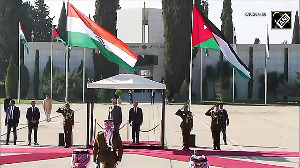'No shifting or deviation' from the July 18 nuclear deal will be agreed to, asserted Minister of State External Affairs Anand Sharma in the Rajya Sabha emphasising there will be 'no capping' of India's military nuclear programme, based on the principle of credible minimum deterrence.
Let there not be any 'misgivings or concerns' on this score, Sharma said intervening in the short-duration discussion on Indo-US nuclear deal in which opposition parties made scathing attack on the government for a 'sell out' compromising the country's security interests.
Accusing the Opposition of adopting a partisan approach to the issue, Sharma said the United Progressive Alliance government had adopted a 'transparent' approach in sharing information on the deal. This was the third time that a discussion was taking place on the issue.
This was in sharp contrast to the National Democratic Alliance government, which carried out talks in a non-transparent manner with the then US Deputy Secretary of State Strobe Talbott, he said.
This government had shown utmost responsibility by laying on the table of Parliament all information pertaining to the Indo-US nuclear deal, he added.
The Minister said there was no question of relenting on autonomy of India's strategic nuclear programme and the prime minister's assurance to Parliament that India will not agree to any additional obligation or conditionality to the July 18 agreement is categorical.
Sharma said the country's three-stage nuclear programme as enunciated by India's first prime minister late Jawaharlal Nehru and father of India's nuclear programme, late Homi Bhaba, has been retained under the Indo-US deal. The three-stage programme included development of plutonium-based fast breeder reactor and thorium-based indigenous fast breeder reactors in the third stage, he added.
"It was under the leadership of late Congress prime minister Indira Gandhi, India carried out its first nuclear test in 1974 and to say that we have compressed and shackled the country's nuclear programme was far from truth," Sharma said.
Regarding the separation plan of civilian and military nuclear installations under the Indo-US nuclear deal, he said the country's military nuclear programme had been kept intact. "The country's security interests have neither been compromised nor are there any capping of the military nuclear programme," he said, adding that India's policy of having nuclear credible minimum deterrence has been kept 'untouched' under the deal.





